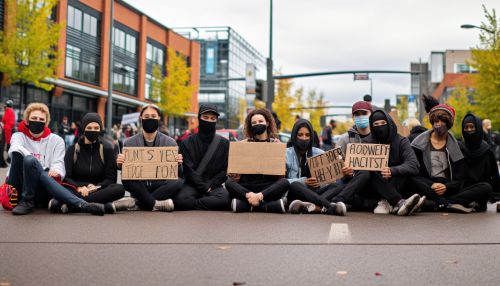Civil disobedience
Definition and Overview
Civil disobedience is a form of political protest that involves the deliberate violation of laws deemed unjust. It is a non-violent method of resistance, often used as a means of effecting legal or social change. Civil disobedience is typically characterized by its public and peaceful nature, its willingness to accept legal consequences, and its aim to bring about change in laws or government policies.
Historical Context
The concept of civil disobedience has a long history, dating back to ancient times. However, it was not until the 19th century that the term itself was coined by American author and philosopher Henry D. Thoreau. In his 1849 essay, "Resistance to Civil Government," Thoreau argued that individuals have a moral responsibility to resist unjust laws and that such resistance could take the form of civil disobedience.
Forms of Civil Disobedience
Civil disobedience can take many forms, depending on the context and the goals of the protestors. Some common forms include sit-ins, strikes, boycotts, and non-compliance with specific laws or regulations. While these actions are technically illegal, they are carried out in a peaceful and non-violent manner, with the intent of drawing attention to a particular issue or cause.
Theories and Philosophies
Several theories and philosophies have been developed to explain and justify the use of civil disobedience. These include the moral and political philosophy of civil disobedience, the legal theory of civil disobedience, and the social and cultural theory of civil disobedience. Each of these theories offers a different perspective on the nature, purpose, and legitimacy of civil disobedience.
Notable Instances
There have been numerous notable instances of civil disobedience throughout history, many of which have led to significant social and political change. These include the American Civil Rights Movement, the Indian Independence Movement, and the Anti-Apartheid Movement in South Africa.
Legal and Ethical Considerations
Civil disobedience raises a number of legal and ethical considerations. From a legal perspective, it involves the deliberate violation of laws, which can result in penalties such as fines, imprisonment, or both. From an ethical perspective, it raises questions about the morality of breaking laws, even for a just cause, and the potential for civil disobedience to lead to social disorder or anarchy.
Impact and Legacy
The impact and legacy of civil disobedience are far-reaching. It has played a crucial role in bringing about social and political change in many parts of the world, and continues to be a powerful tool for social justice movements. At the same time, it has also been the subject of ongoing debate and controversy, particularly in relation to its legality and morality.
See Also


